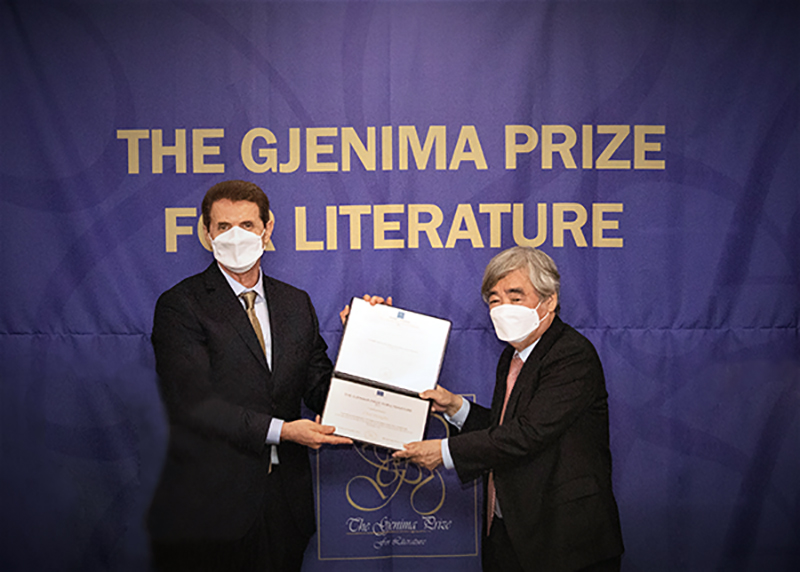Korea's Choi Dongho Honored with Gjenima Prize for Literature

Los Angeles, CA, December 24, 2021 --(PR.com)-- Mundus Artium Press announces the award of the 2021 Gjenima Prize to Korean poet, critic and scholar Choi Dongho.
Established in 2004, the annual Gjenima Prize recognizes the creator of an important body of literary work or a single major literary achievement that has played a part in current history.
Choi Dongho received the award personally from Gjenima Prize committee chair Dr. Gjeke Marinaj at a ceremony held Oct. 5 at Korea University, Seoul.
The ceremony included congratulations from Korea University President Jintaek Jeong, as well as introductory remarks Byeong-ho Jeong, dean of the College of Liberal Arts, and Seong-ho Yoo, dean of the College of Humanities at Hanyang University.
A Professor Emeritus of Korean Language and Literature, having begun teaching at Korea University in 1988, Choi Dongho has served as the president of the Society of Korean Poets, as well as the founding president of Korea's Poetry Loving Society.
He currently serves as a director of the Hoam Foundation, a major Korean organization for the support of academic and research activities in science and culture.
Active as a critic for the past 40 years, Choi Dongho has increasingly devoted himself to poetry. His latest collection, Monarch Butterfly (Mundus Artium Press, 2021), features English translations of poems selected from volumes published in Korean over several decades.
Anthologies of Choi Dongho's poetry have also been published in translation in Russia, Mongolia and Romania.
Published with the support of the Daesan Foundation for the international promotion of Korean literature, Monarch Butterfly has been acclaimed for "succinct and evocative intensity" which "emerges from skilled mental concentration" and "deliberately guides the reader through a new way of knowing which departs from typical conventions," as noted in a Daily Press review of the book.
Choi Dongho's poetry expresses a Buddhist worldview. He has established himself as a proponent of what he terms "extreme lyric poetry," or guekseojeongsi in Korean. Characterized by conciseness and the inclusion of dramatic elements alongside lyricism and spiritual focus, extreme lyric poetry represents an effort to reclaim Korean poetic traditions in the wake of the popularity of deconstructionism.
Recognized as an heir to the legacy of the great modern Korean poets Cho Chi-hu and Jeong Ji-yong, Choi Dongho wholly embodies the the Gjenima Prize's vision of the "majestic spirit of the written word in the interest of the human race."
Choi Dongho has been a Visiting Scholar at UCLA and at Waseda University, and has taken part in the University of Iowa’s International Writing Program.
His major prizes and distinctions include the Modern Buddhist, Daesan, Park Dujin, Gosan Yun Sundo, Yusim and Kim Satgot literary awards, as well as the Manhae Grand Prize for Literature and Art. He participated in the December 2011 Nobel Prize Award Ceremony, becoming the first Korean writer officially invited by the Nobel Committee to do so.
Established in 2004, the annual Gjenima Prize recognizes the creator of an important body of literary work or a single major literary achievement that has played a part in current history.
Choi Dongho received the award personally from Gjenima Prize committee chair Dr. Gjeke Marinaj at a ceremony held Oct. 5 at Korea University, Seoul.
The ceremony included congratulations from Korea University President Jintaek Jeong, as well as introductory remarks Byeong-ho Jeong, dean of the College of Liberal Arts, and Seong-ho Yoo, dean of the College of Humanities at Hanyang University.
A Professor Emeritus of Korean Language and Literature, having begun teaching at Korea University in 1988, Choi Dongho has served as the president of the Society of Korean Poets, as well as the founding president of Korea's Poetry Loving Society.
He currently serves as a director of the Hoam Foundation, a major Korean organization for the support of academic and research activities in science and culture.
Active as a critic for the past 40 years, Choi Dongho has increasingly devoted himself to poetry. His latest collection, Monarch Butterfly (Mundus Artium Press, 2021), features English translations of poems selected from volumes published in Korean over several decades.
Anthologies of Choi Dongho's poetry have also been published in translation in Russia, Mongolia and Romania.
Published with the support of the Daesan Foundation for the international promotion of Korean literature, Monarch Butterfly has been acclaimed for "succinct and evocative intensity" which "emerges from skilled mental concentration" and "deliberately guides the reader through a new way of knowing which departs from typical conventions," as noted in a Daily Press review of the book.
Choi Dongho's poetry expresses a Buddhist worldview. He has established himself as a proponent of what he terms "extreme lyric poetry," or guekseojeongsi in Korean. Characterized by conciseness and the inclusion of dramatic elements alongside lyricism and spiritual focus, extreme lyric poetry represents an effort to reclaim Korean poetic traditions in the wake of the popularity of deconstructionism.
Recognized as an heir to the legacy of the great modern Korean poets Cho Chi-hu and Jeong Ji-yong, Choi Dongho wholly embodies the the Gjenima Prize's vision of the "majestic spirit of the written word in the interest of the human race."
Choi Dongho has been a Visiting Scholar at UCLA and at Waseda University, and has taken part in the University of Iowa’s International Writing Program.
His major prizes and distinctions include the Modern Buddhist, Daesan, Park Dujin, Gosan Yun Sundo, Yusim and Kim Satgot literary awards, as well as the Manhae Grand Prize for Literature and Art. He participated in the December 2011 Nobel Prize Award Ceremony, becoming the first Korean writer officially invited by the Nobel Committee to do so.
Contact
MAP
Darla Spek
214-836-0336
mundusartiumpress.org
Darla Spek
214-836-0336
mundusartiumpress.org
Categories
